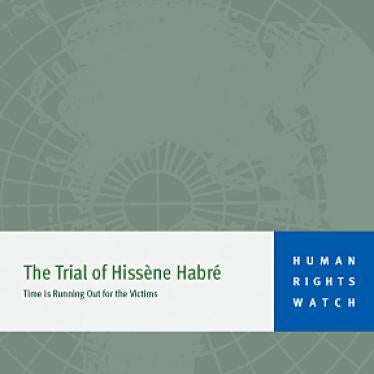(Brussels) - The Belgian Parliament's repeal of its landmark "universal jurisdiction" statute is a step backwards in the global fight against the worst atrocities, six human rights groups said today. Nonetheless, some cases already being investigated by Belgian courts will continue, including those concerning Rwanda, Guatemala and Chad's Hissène Habré.
Belgium's 1993 universal jurisdiction law, which permitted victims to file complaints in Belgium for atrocities committed abroad, had made Belgium a leader in the struggle for international justice, the groups said. Now, the Belgian law resembles that of other European countries.
"With its universal jurisdiction law, Belgium helped destroy the wall of impunity behind which the world's tyrants had always hidden to shield themselves from justice," said the groups. "It is regrettable that Belgium has now forgotten the victims to whom it gave a hope of justice."
The groups denounced the pressure from the United States which led Belgium to today's action. In June, U.S. Defense Secretary Donald H. Rumsfeld threatened Belgium that it risked losing its status as host to NATO's headquarters if it did not rescind the law. The groups said that the U.S. attack was part of its worldwide campaign against international justice, including the International Criminal Court. The U.S. campaign, as well as the Belgian about-face, go against a growing global trend to hold accountable those accused of the worst crimes, which can be seen in the creation of war crimes tribunals for Rwanda and Yugoslavia, and the International Criminal Court. More than one hundred states have adopted some form of universal jurisdiction, permitting them to pursue the authors of international crimes.
After today, Belgian courts will only have jurisdiction over international crimes if the accused is Belgian or has his primary residence in Belgium; if the victim is Belgian or has lived in Belgium for at least three years at the time the crimes were committed; or if Belgium is required by treaty to exercise jurisdiction over the case. The new law also considerably reduces victims' ability to obtain direct access to the courts - unless the accused is Belgian or has his primary residence in Belgium, the decision whether or not to proceed with any complaint rests entirely with the state prosecutor. Belgium has thus restricted the reach of universal jurisdiction in its courts by adopting a law similar to or more restrictive than most European countries.
The law adopted today does, however, preserve a limited number of cases that have already begun to move forward, including those concerning the Rwandan genocide and the killing of two Belgian priests in Guatemala, as well as the complaints filed against ex-Chadian dictator Hissène Habré. In the Habré case, a Belgian investigating judge went to Chad in 2002 to investigate the crimes. Habré is currently under house arrest in Senegal, and in October 2002 the Chadian government waived any immunity which Habré might seek to assert, removing one of the last potential hurdles to his extradition and trial. The groups said that his trial would be important to send a message to tyrants around the world that their impunity is a thing of the past.
NGOs: Amnesty International Belgium, La Ligue des Droits de l'Homme, Liga voor Mensenrechten, la Fédération Internationale des Droits de l'Homme, Avocats sans Frontières and Human Rights Watch.






